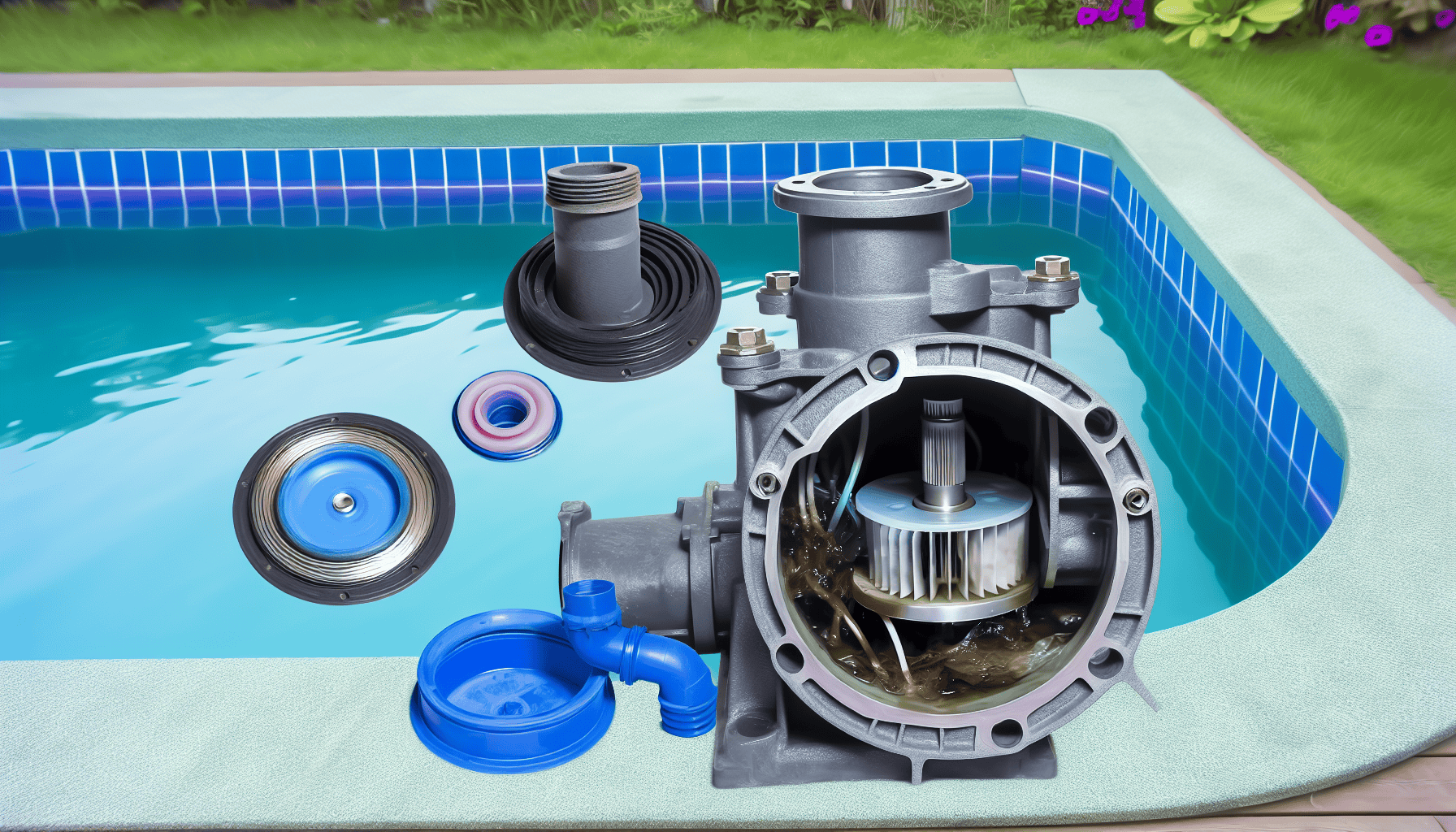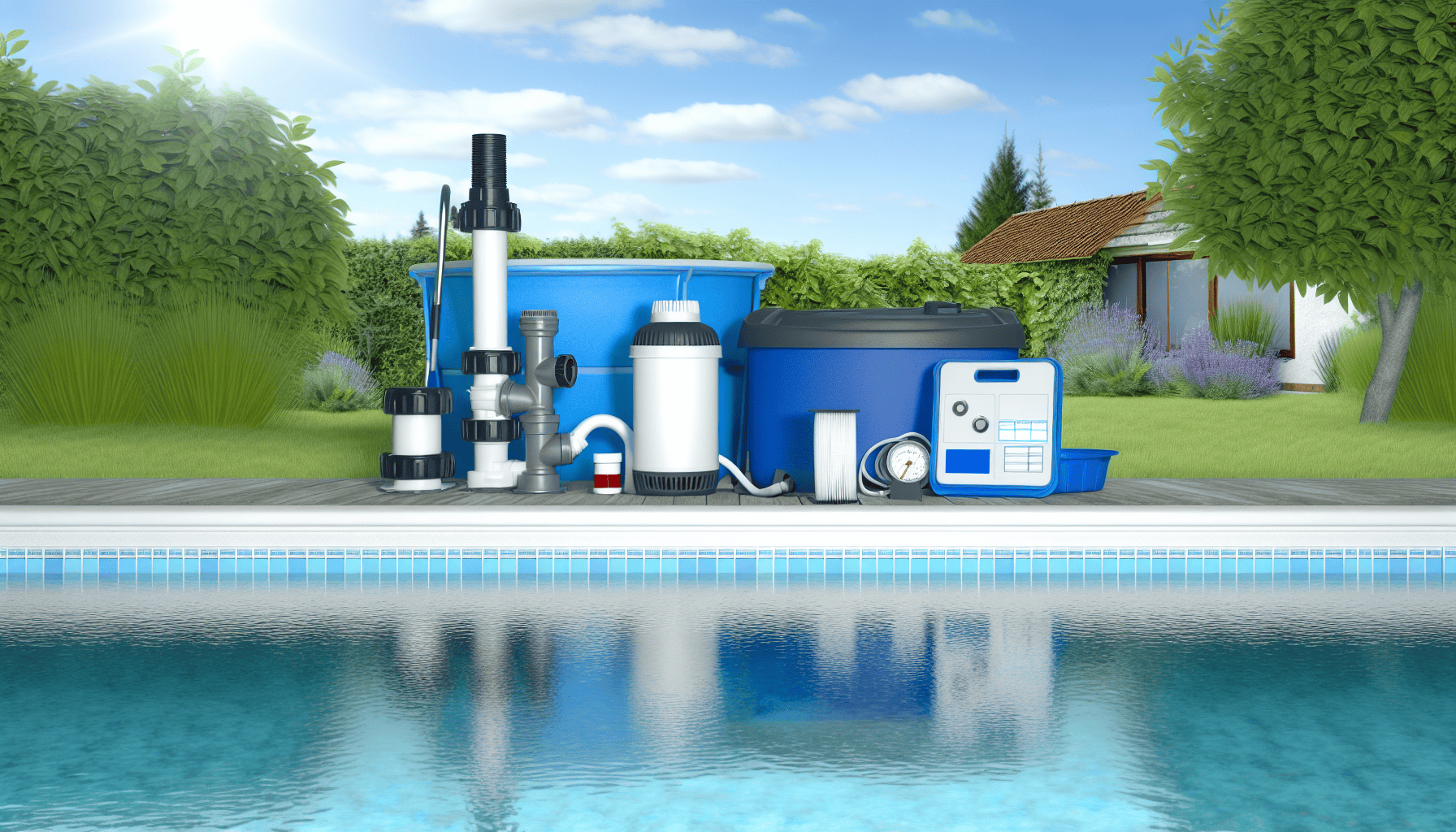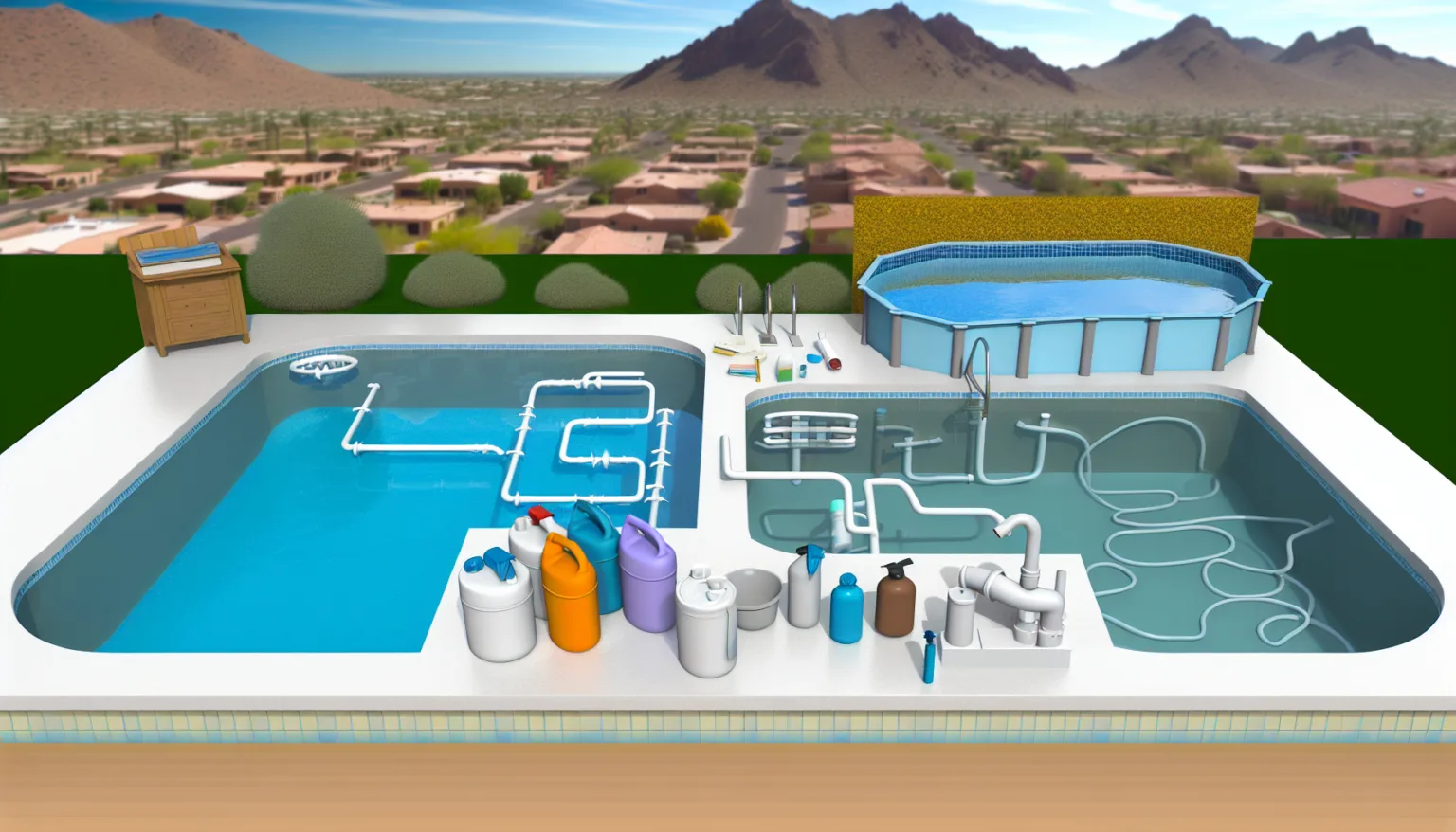Saltwater vs Freshwater Pools in Scottsdale
Introduction
With our unique climate, deciding between a freshwater and a saltwater pool involves more than just personal preference. This article dives into the key differences between these pool types, focusing on how Scottsdale’s hot and dry climate influences maintenance, water chemistry, costs, health benefits, and environmental impacts. From the basics of each system to the nuanced challenges of desert pool maintenance, we’ve covered everything to help you navigate your best option. Ready to take the plunge? Let’s explore what it truly means to own a saltwater vs. a freshwater pool in our distinctive Arizona environment.
Table of Contents
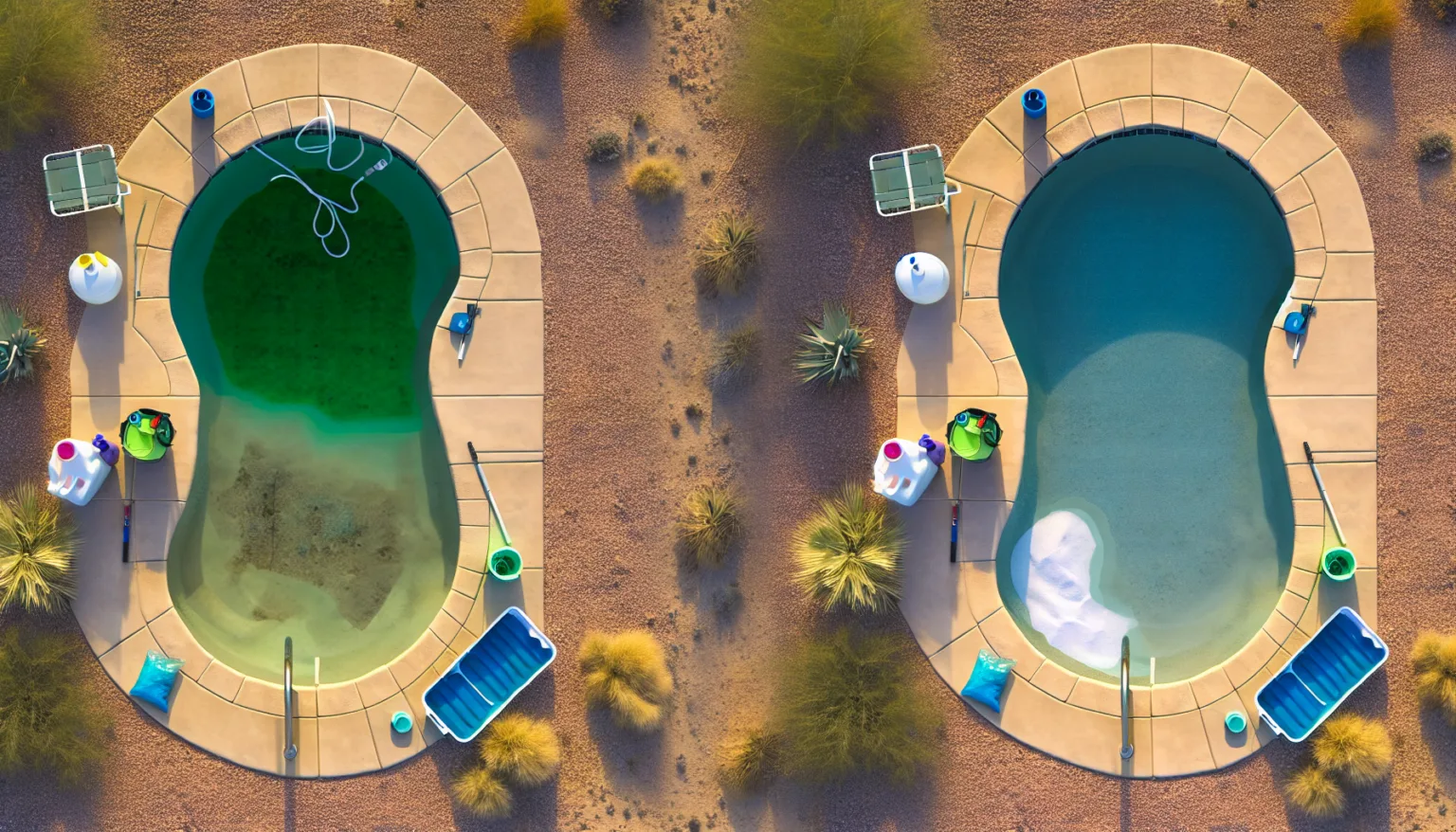
Understanding the Basics: Freshwater vs. Saltwater Pools
Choosing between a freshwater and a saltwater pool is a big decision for any homeowner. Let’s break down the basics to help you make an informed choice.
What Sets Them Apart?
At their core, the main difference lies in how they are sanitized.
- Freshwater pools use chlorine tablets or sticks directly added to the water to keep it clean and clear.
- Saltwater pools, on the other hand, use a salt chlorine generator. This device converts salt into chlorine, offering a more natural feel to the water.
Maintenance Needs
Maintenance plays a massive role in your decision. Here’s a snapshot:
- Freshwater pools require frequent chemical balance checks and adjustments.
- Saltwater pools often need less chemical intervention, as the salt cell generates chlorine consistently.”
Installation and Running Costs
Cost considerations can’t be ignored.
- Installing a saltwater system might cost more upfront. However, the reduced need for chemical purchases can balance this over time.
- Conventional freshwater pools are cheaper to set up but could have higher recurring costs for chemicals and shock treatments.
Moreover, understanding how each system interacts with your pool’s surroundings and equipment is crucial. Salt can corrode certain materials, which is a consideration worth noting for pool hardware longevity. The Centers for Disease Control and Prevention (CDC) offers extensive insights into healthy swimming pools, including the impact of different sanitization methods on water quality.
Ultimately, your choice will hinge on your priorities—maintenance ease, cost, or the swimming experience. Reflect on these points to find the best option for your Scottsdale home.
Climate Considerations in Scottsdale for Pool Owners
Scottsdale’s unique climate poses specific challenges for pool owners. Understanding these can help you decide between freshwater and saltwater pools.
High Temperatures and Evaporation Rates
With Scottsdale’s high temperatures, evaporation is a major issue.
- Freshwater pools may require more frequent top-ups, affecting water chemistry and necessitating additional adjustments.
- Saltwater pools also lose water but maintain a more consistent salinity level, potentially reducing the need for constant chemical balancing.
Effect on Maintenance and Equipment
The climate impacts the water, maintenance routines, and pool equipment.
- In freshwater pools, higher evaporation rates can lead to more concentrated chemicals, wearing down equipment faster.
- Although generally gentler on swimmers’ eyes and skin, saltwater pools may require more attention to prevent salt-induced corrosion on specific pool components.
Water Conservation Concerns
Water usage is a critical consideration in desert climates.
- Freshwater pools might necessitate more frequent refilling, raising concerns about water conservation.
- Saltwater systems, thanks to their lower evaporation impact and consistent salinity, can be slightly more water-efficient.
Considering Scottsdale’s desert environment, it is crucial to choose a pool that supports water conservation efforts. The Water—Use It Wisely campaign offers valuable tips for homeowners on minimizing water usage, including in pool operation.
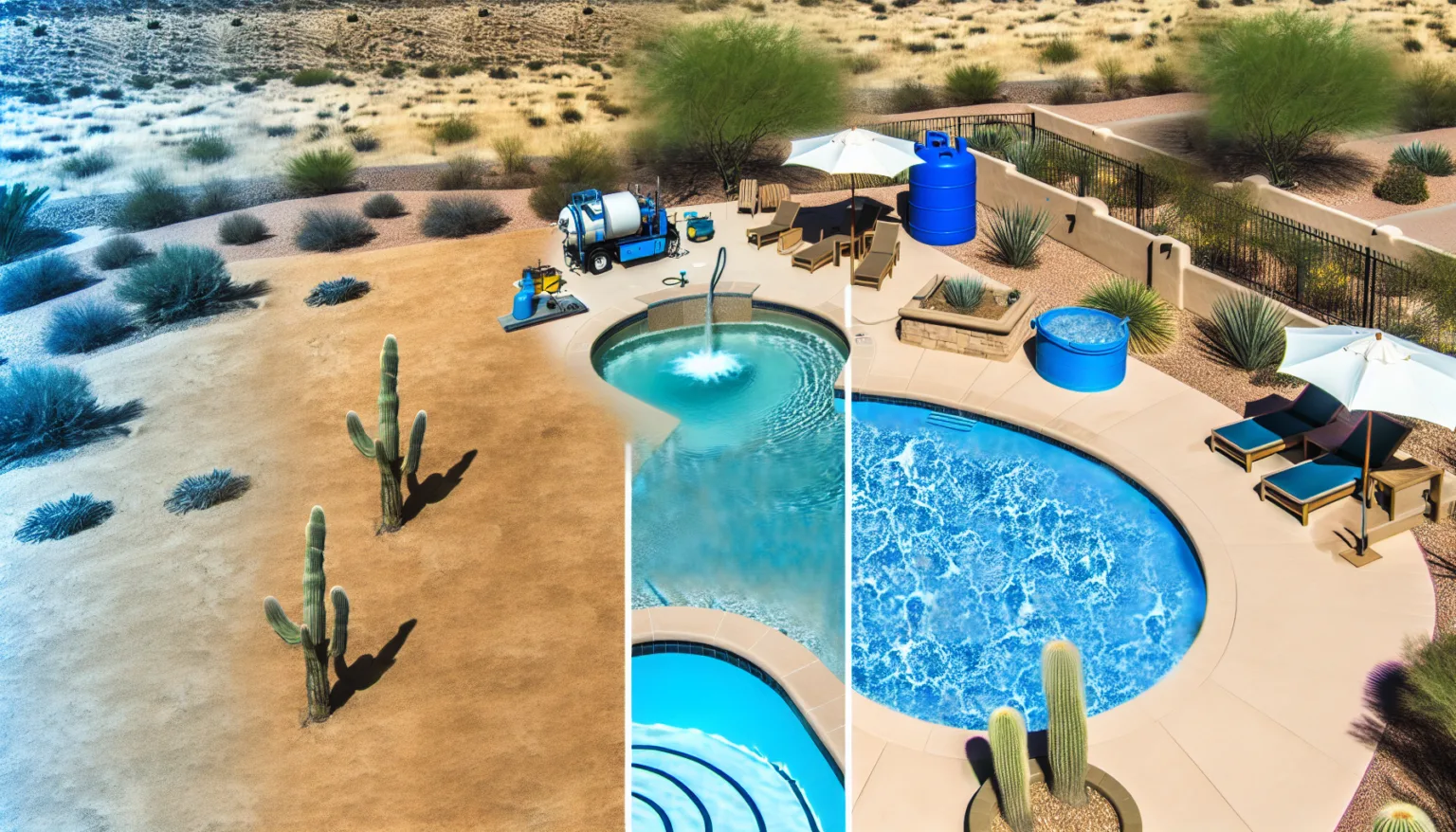
Impact of Scottsdale’s Climate on Pool Water Chemistry
In Scottsdale’s hot and dry climate, maintaining the correct water chemistry in your pool is a game-changer for longevity and swimmer comfort. Here’s how this climate affects different pool types.
Water Chemistry Balance
The balance of your pool’s water chemistry is pivotal.
- Scottsdale’s rapid evaporation rates in freshwater pools can quickly lead to imbalanced pH, alkalinity, and chlorine levels, requiring diligent monitoring and adjustment.
- Saltwater pools generally maintain a more stable chemical balance. However, high temperatures can tax the salt cell’s efficiency, necessitating monitoring and occasional adjustments.
Impact on Sanitization
Sanitization is vital to keeping pools healthy and clear.
- The increased evaporation and chemical concentration boost the demand for chlorine and other sanitizing chemicals for freshwater pools.
- While the salt cell produces chlorine in saltwater pools, extreme temperatures can reduce its effectiveness, potentially requiring supplemental chlorine during peak summer months.
Algae Growth Challenges
Scottsdale’s climate is a paradise for algae if not strictly controlled.
- Increased temperatures can accelerate algae growth in freshwater pools, necessitating regular shock treatments and algaecides.
- Saltwater pools benefit from a more constant delivery of chlorine, which can help inhibit algae growth, though they are not immune, especially in corners where water circulation is low.
Understanding these nuances is crucial for maintaining a healthy, enjoyable pool. For more tips on keeping your pool’s water chemistry, visit our guide on Algae Treatment. The Environmental Protection Agency (EPA) also provides valuable information on water quality and treatment, which can be applied to effective pool management.
Maintenance and Upkeep: Saltwater vs. Freshwater Pools in Scottsdale
The Scottsdale environment dictates specific requirements for pool maintenance. Both saltwater and freshwater systems have advantages and challenges.
Routine Cleaning and Surveillance
- Freshwater pools demand regular chemical testing and adjustments to stay clear and safe.
- Saltwater pools require less frequent chemical handling. Yet, the salt cell and other components need checks for buildup and wear.
Addressing Evaporation and Filtration
- Due to high evaporation rates, freshwater pool owners often add water, affecting the chemical balance and requiring adjustment.
- Saltwater pools cope better with evaporation. Salt levels stay relatively stable, but filters may need more frequent cleaning due to the added salt content.
Equipment Longevity and Care
- In freshwater systems, consistent chemical adjustments can wear on pool equipment over time.
- Saltwater systems are generally gentler on equipment due to stable pH levels, but salt corrosion can be an issue for certain metals and finishes.
Maintenance tasks vary, but both pool types share the need for regular care to ensure a clean, enjoyable swimming environment. At Bo Knows Pool Equipment Services, we provide ideal solutions for keeping your pool in top shape, no matter the type. For detailed maintenance tips, the SwimmingPool.com maintenance guide offers a comprehensive look at keeping your pool pristine.
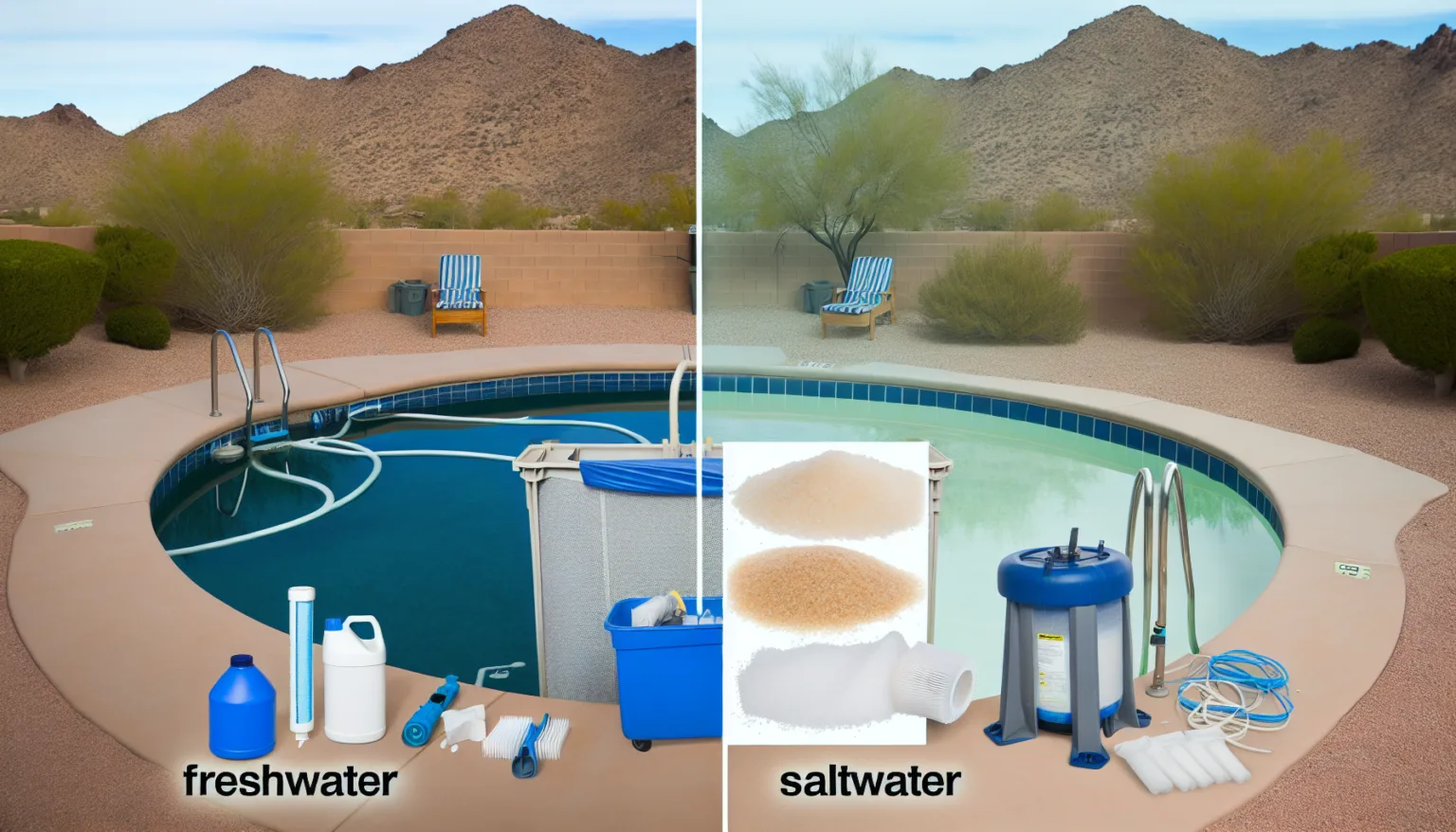
Cost Analysis: Initial Setup and Long-Term Maintenance
Costs play a significant role when choosing between a saltwater and a freshwater pool. The initial setup and the long-term maintenance have different financial implications for pool owners in Scottsdale.
Initial Installation Costs
- Freshwater pools generally have lower initial setup costs. Basic equipment and chemical start-up kits are relatively affordable.
- Saltwater pools require the purchase and installation of a salt chlorine generator, which can significantly increase initial costs.
Long-Term Maintenance Expenses
- Freshwater pools tend to have higher ongoing chemical costs. Regular purchases of chlorine and other chemicals add up over time.
- Saltwater pools, while costing more upfront, usually see lower chemical expenses. The salt cell produces chlorine, reducing the need for chemical purchases.
Equipment Lifespan and Replacement Costs
- Consistent chemical balancing can extend equipment lifespan for freshwater pools, though occasional replacements are inevitable.
- Saltwater pool equipment can suffer from corrosion over time, potentially leading to higher replacement costs for certain components.
Given these considerations, pool owners should weigh the immediate financial outlay against the long-term savings. While saltwater pools may present higher upfront costs, their lower ongoing expenses can be a boon for budget-conscious homeowners. Moreover, selecting energy-efficient and durable equipment can further optimize costs, a topic thoroughly explored by Energy.gov in their guide on swimming pool covers and other energy-saving pool accessories.
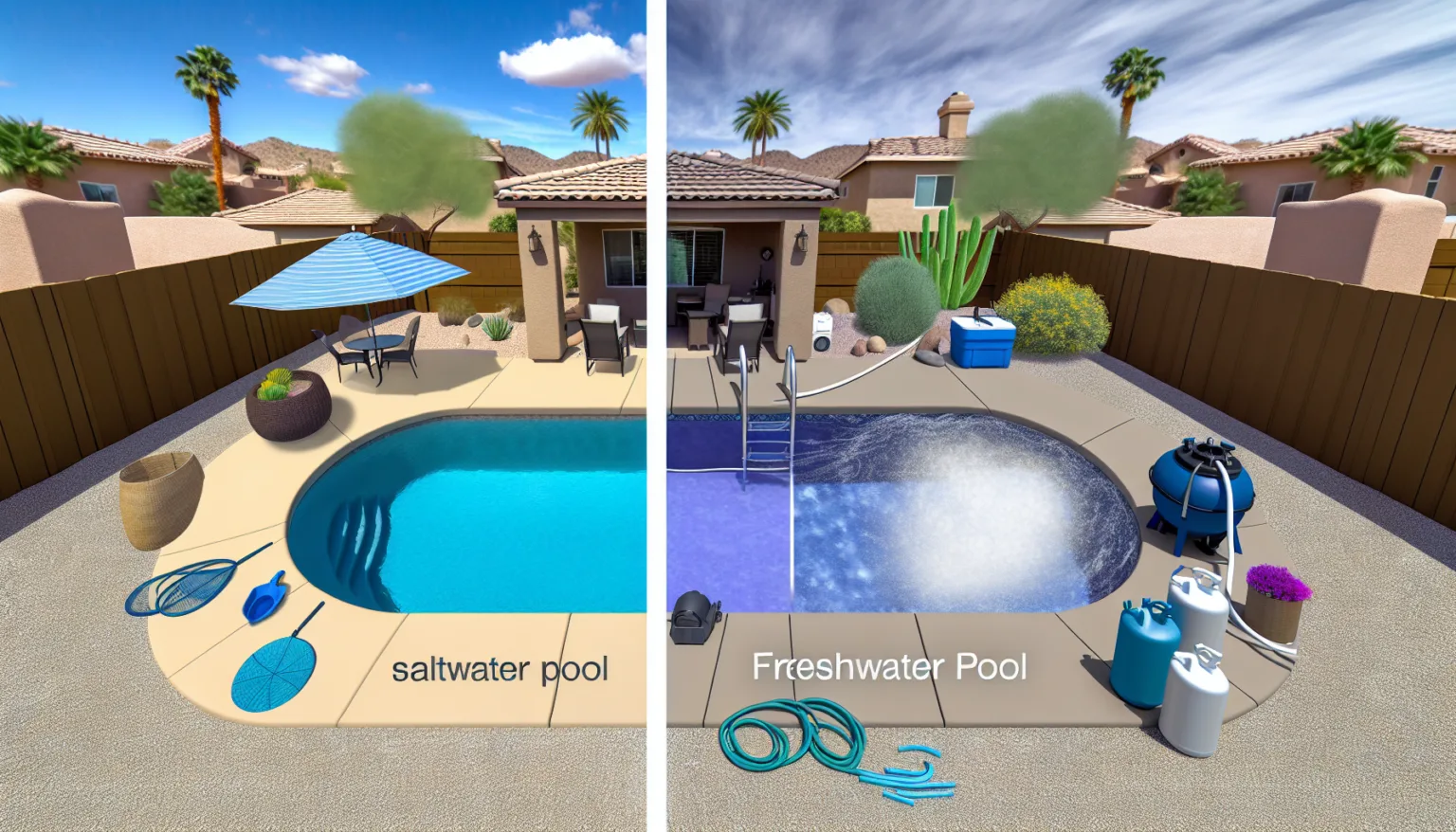
Health and Comfort: Benefits of Saltwater and Freshwater Pools
The health and comfort of swimmers are essential factors in the saltwater versus freshwater pool debate. Each type offers unique benefits that can influence a homeowner’s choice, especially in Scottsdale’s scorching temperatures.
Skin and Eye Comfort
- Freshwater pools often require higher levels of chlorine, which can irritate the skin and eyes of sensitive individuals.
- Saltwater pools produce chlorine more naturally and gradually, resulting in softer water that is generally kinder to the skin and eyes.
Air Quality around the Pool
- Chloramines, a byproduct of chlorine sanitizers in freshwater pools, can affect the air quality around the pool and potentially irritate respiratory systems.
- Saltwater pools have fewer chloramines, improving air quality and less irritation for swimmers enjoying the poolside ambiance.
Healthier Water
- The constant addition of chemicals to freshwater pools can result in an imbalance that, if not carefully managed, might foster bacteria and algae.
- The salinity level in saltwater pools creates an environment less conducive to bacteria and algae, potentially resulting in cleaner, healthier water.
Deciding between a saltwater and freshwater pool involves weighing the benefits to health and comfort. While saltwater pools offer a more natural sanitization process and potentially fewer irritants, freshwater pools provide a traditional swimming experience that many are accustomed to. Ensuring your pool is properly maintained is key to providing a safe and enjoyable swimming environment regardless of the type.
Environmental Impacts in a Desert Climate
In Scottsdale’s desert climate, your pool’s environmental footprint is an essential consideration. Both saltwater and freshwater pools have distinct environmental impacts.
Water Usage and Conservation
- Freshwater pools, especially during the hot months, may need frequent water top-offs due to evaporation, which can impact water conservation efforts.
- Saltwater pools tend to have slightly better water retention, but the initial fill requires significant water.
Chemical Use and Exposure
- High chemical use in freshwater pools can lead to more significant environmental exposure, especially if improperly handled.
- Saltwater pools reduce the need for added chemicals, diminishing the potential for chemical runoff and exposure.
Energy Consumption
- Maintaining the filtration and sanitization systems in any pool requires energy, impacting your carbon footprint.
- Energy-efficient systems and solar-powered heaters can offset some of these impacts, providing a more sustainable option.
Choosing a pool with a lower environmental impact means considering water use, chemical exposure, and energy consumption. While no pool is entirely without its environmental footprint, adopting responsible maintenance practices can significantly reduce these effects. For instance, covering your pool when not in use can dramatically reduce evaporation, a tip further explored in the Energy.gov guide on energy-saving pool strategies.
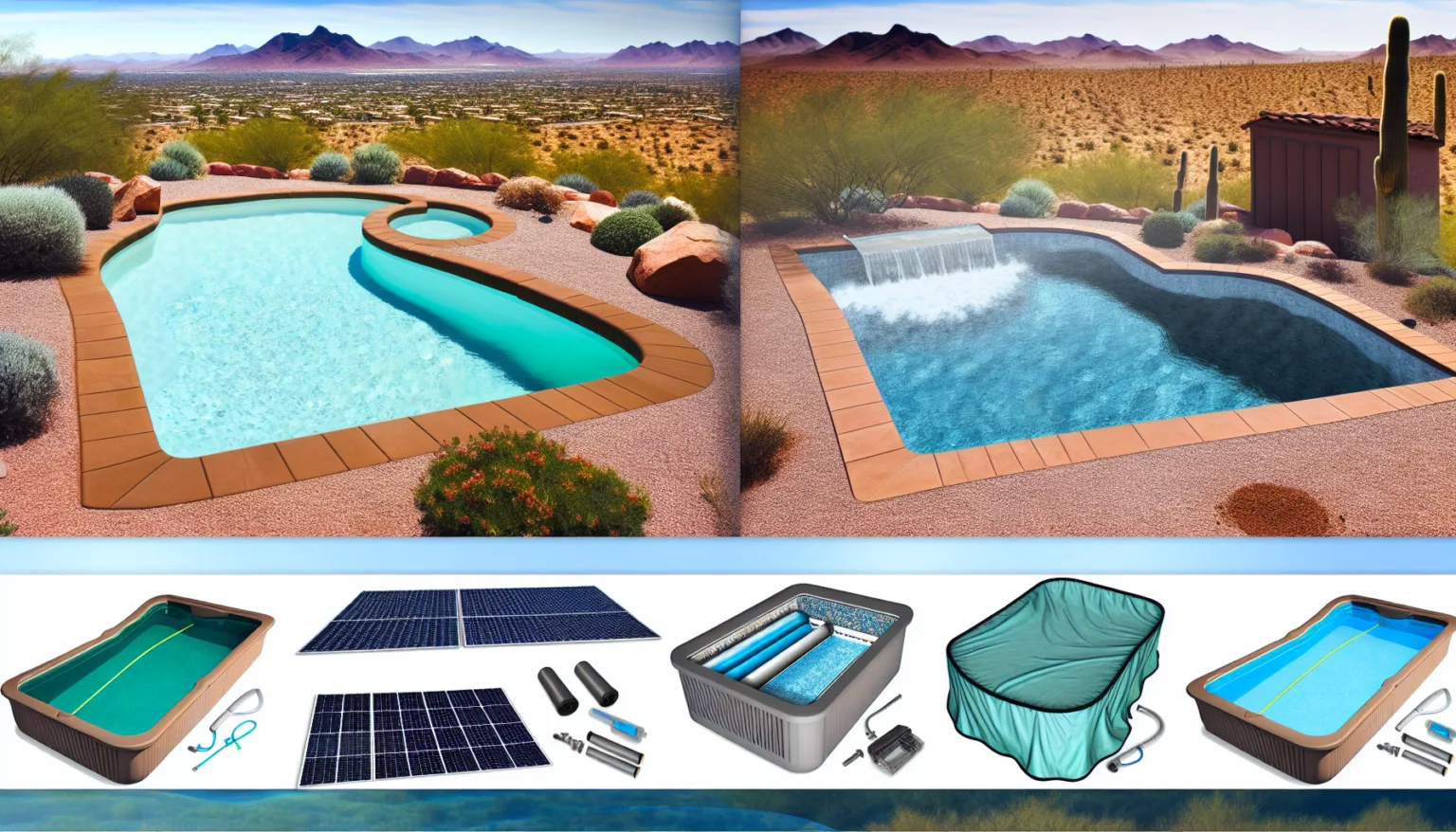
FAQs
You likely have questions about whether you’re new to pool ownership or considering switching. Here, we tackle some of the most common questions about choosing between saltwater and freshwater pools in Scottsdale.
Can I convert my freshwater pool to a saltwater system?
Yes, converting a freshwater pool to a saltwater system is possible. It involves installing a salt chlorine generator and making a few adjustments. Remember, the equipment and installation may cost money.
Which pool type is better for sensitive skin?
Saltwater pools tend to be gentler on the skin. The natural approach to chlorine generation results in softer water, which many find more comfortable.
How often do I need to add salt to a saltwater pool?
Salt only needs replenishment once or twice a year, depending on rainfall and pool usage. However, it’s crucial to test and adjust as needed regularly.
Do saltwater pools require less maintenance?
While saltwater pools generally require less chemical handling, they’re not maintenance-free. Regular checks of the salt chlorine generator and pH levels are necessary.
Are saltwater pools more expensive than freshwater pools upfront?
Saltwater pools usually have a higher initial cost due to the required salt chlorine generator. However, this can balance out over time with reduced chemical costs.
With answers to these common questions, homeowners can make a more informed decision about their pool type. For further guidance, our team at Bo Knows Pools is ready to assist.
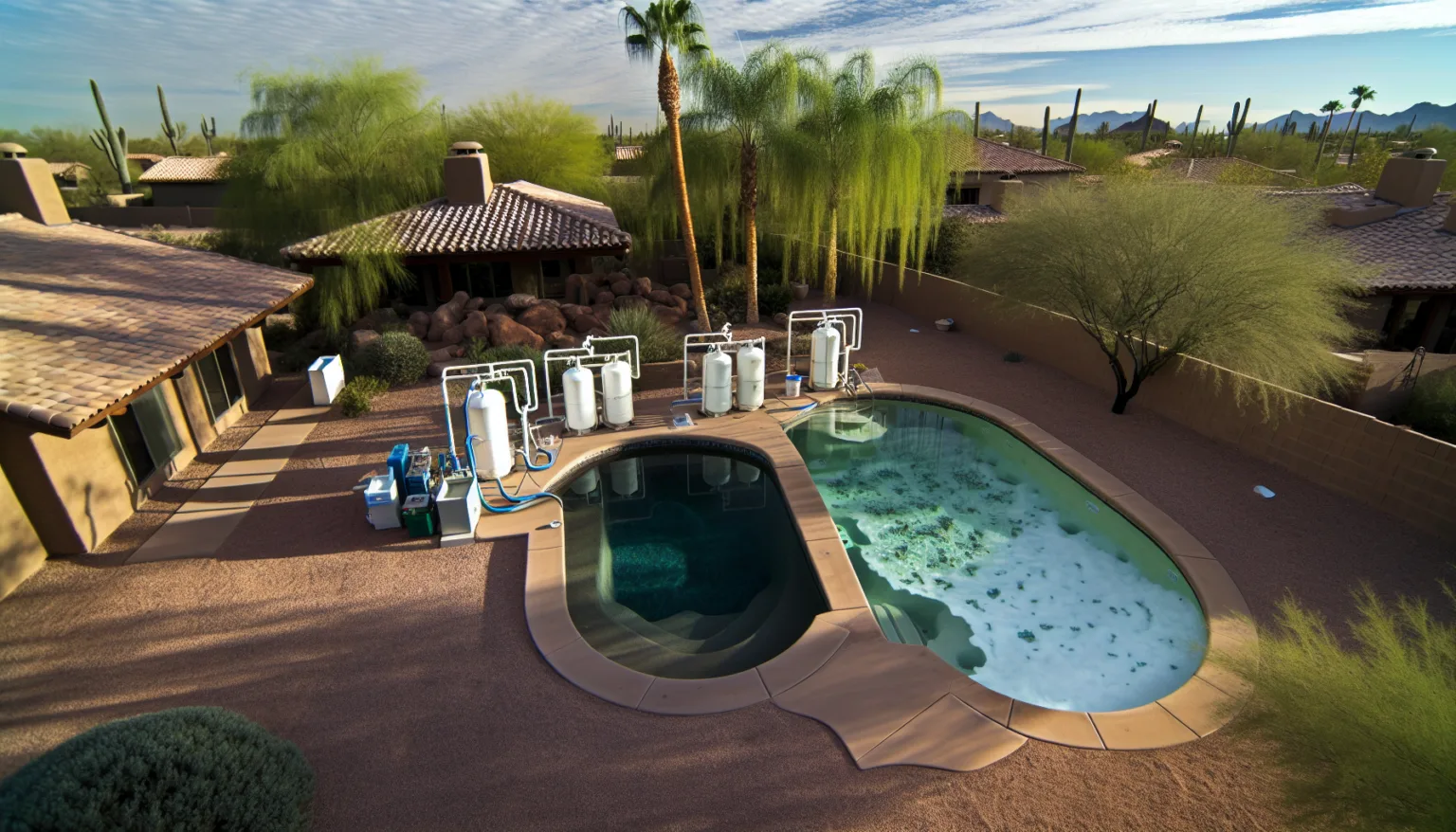
Conclusion
Choosing between a saltwater and freshwater pool involves careful consideration of maintenance needs, costs, health implications, and environmental impacts. We’ve explored the nuances of each pool type to help you make an informed decision that aligns with your lifestyle and preferences. Whether you lean towards the natural feel of a saltwater pool or the traditional chlorine system of freshwater pools, understanding Scottsdale’s specific challenges ensures your pool remains a source of joy and relaxation year-round. Remember, the key to a pristine pool lies in regular care and choosing the right weekly pool service partner. Consider your options, weigh the benefits, and, when in doubt, reach out to the professionals who can guide you toward the perfect backyard oasis. Your ultimate pool experience awaits in the beautiful desert landscape of Scottsdale.


